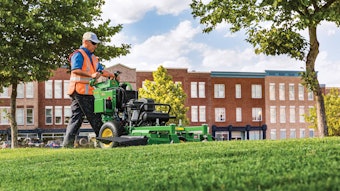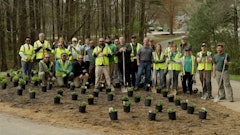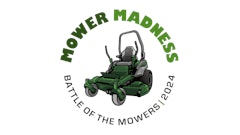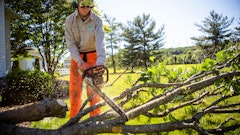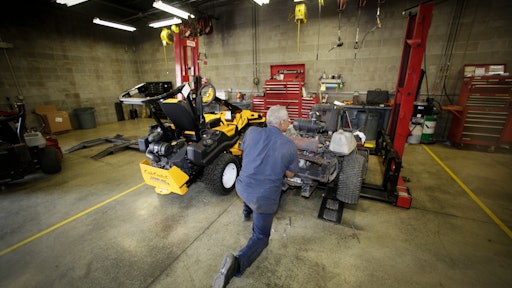
Landscaping companies and equipment dealers are hurting for employees, and Pennsylvania’s secretary of agriculture is doing something about it.
Russell Redding, who served as agriculture secretary from 2009-2011 before being reappointed in May 2015, has directed a robust workforce development initiative designed to attract more workers to several dozen occupations in the agriculture and food industries. Landscaping/groundskeeping workers and farm equipment technicians are on that list of occupations.
Scott Sheely, D.Ed., has been tapped to lead the effort as special assistant for workforce development at the Pennsylvania Department of Agriculture. Sheely’s background makes him ideally suited to the job. He had served as director of the Lancaster County Workforce Investment Board where his team helped to develop an apprenticeship program for the manufacturing industry. After going on hiatus to complete his doctorate, Sheely returned to public service a couple of years ago to help apply much of what had been done in manufacturing to the agriculture industry.
Tech apprenticeship program under development
The latest effort is the development of a farm equipment technician apprenticeship program. As a matter of fact, Sheely and his team have been working on it for a good year and a half. “It takes a lot of time and effort to write up all of the materials,” Sheely says. “The good news is that we’d recently received a grant through The Steinman Foundation which will allow us to hire someone to write up all of the materials. So we expect this to get moving along fairly quickly now.”
The Steinman Foundation is the combination of two family foundations that were established in 1951 by brothers James Hale Steinman and John Frederick Steinman. In 2014 when the two foundations merged, the families confirmed the mission to improve the quality of life in the communities that comprise Lancaster County.
While much progress is being made with the apprenticeship program, a few hurdles remain. “We want to get the program registered through the Pennsylvania Department of Labor & Industry,” Sheely points out. “We also want to get more dealers involved. Dealers are a very important part of this because they are the ones who’ll be hiring apprentices.”
Sheely says he and his team have been talking to a half-dozen dealers in the region who have been offering input and helping with product development. Two large manufacturers have also been involved.
The apprenticeship program is being designed with two pieces. First, the apprentice undergoes related training through a tech school or online course, etc. Second, on-the-job training is specified and provided by the employer (dealer).
“We’re designing this so advancement through the program is based on the demonstration of certain skills,” Sheely explains. “When you demonstrate a skill and advance, you get a raise. By the end of the apprenticeship, you’d be at a full wage.”
Many apprenticeship programs can last three to four years, Sheely points out. Because this one would be skills-based, advancement through the program could happen much faster.
The related training is an important component. Sheely and his team have been reaching out to tech schools and high schools to promote the program and also ensure that the training they’re providing is on target.
Students are an obvious target audience, which is why outreach to the educational community is so important. “We’d like to create a sort of ‘pre-apprenticeship’ so that what kids are learning in their high school mechanics classes (i.e. small engine repair) would count as credit toward their completion of the apprenticeship program,” Sheely says.
Dislocated workers represent a second target audience. “We’ll promote the apprenticeship program through Career Link from the Pennsylvania Department of Labor & Industry,” Sheely says. “That’s the main place people go job hunting these days. Plus, the Pennsylvania Apprenticeship & Training Council is located within the Department of Labor & Industry, so there’s a good connection which will help get the word out.”
Speaking of getting the word out, Sheely hopes to expand outreach to dealers and educators throughout Pennsylvania. Right now the apprenticeship initiative is largely focused on two counties, Lancaster and Chester.
“We know there is a tremendous need across the Commonwealth, but it takes time to roll something like this out,” Sheely cautions. “Just in Lancaster County, we know we can handle about 10 apprentices per year. If more dealerships want to get involved, that would be great. But the burden is on the dealer because the dealer needs to employ the apprentice. We can help a bit with training costs, of course. But if dealers are really hurting this badly for technicians, I hope more will get involved as we move forward.”
Equipment dealer sees the future
One dealer who has already been quite involved is Don Hoover. It all started roughly eight years ago when he was talking with some of his associates in the agriculture business. They were all telling him that finding employees was becoming far more difficult than in years past. So Hoover decided to invite agriculture secretary Redding to come to his dealership and talk about it. Hoover also invited leaders from area trade schools, including Reading Area Community College and Delaware Valley College (now University), as well as a dozen or so area employers from various ag-oriented industries that were all having a hard time finding employees.
Hoover is the owner of Binkley & Hurst, a multi-location equipment dealership with locations in Pennsylvania, Delaware, Maryland and Virginia. Binkley & Hurst sells numerous farm equipment brands including Case IH and AGCO, along with Gehl/Manitou construction equipment and Ferris, Simplicity and Stihl lawn and garden equipment.
After that successful first meeting eight years ago, state government officials invited Hoover and his contingent to the state capital in Harrisburg, PA, to begin conversations with a broader group of educators.
“Guidance counselors told us they had no idea what great opportunities were available in the agriculture industry,” Hoover recalls. It was a real eye-opener. Hoover knew right then that two things needed to happen: 1) The right message needed to be conveyed to students, parents and educators, and 2) technician compensation had to be more in line with what competing industries were paying.
From there Hoover went to a local jobs fair to begin connecting with students and parents. “About 600 middle school students and their parents came through,” Hoover tells. “As one walked past our booth, we’d say, ‘How about a career in agriculture?’ We were met with a lot of wrinkled noses and responses like, ‘I don’t want to go home smelling like a cow every night,’ or ‘My kid doesn’t want to pick potatoes,’ or ‘My kid wants to work with computers.’ Then we’d tell them, ‘Well come in here and let me show you how this tractor has two on-board computers and how this harvester has four.’ Then they’d stop and say, ‘Oh really? I didn’t know this kind of thing was going on in agriculture.’ So we knew there would need to be a significant educational component to all of this.”
Hoover says farm equipment dealerships like his had been traditionally staffed by people who grew up on farms, although this is much less the case today. At any rate, they understand agriculture and what’s expected of agriculturally oriented customers. “When you go from having to fix a piece of equipment with a pair of slip-joint pliers, an adjustable wrench and a hammer, to where most of the diagnostics on today’s newer equipment has to be done with a laptop computer or some type of gadgetry we didn’t have 20 or 30 years ago, it’s a big change,” Hoover points out.
That’s why Hoover has been bringing in more new employees with two- or even four-year degrees. “Ten years ago, nobody even knew what ‘ag equipment mechatronics’ was,” he relates. “Nowadays, it pretty much rules the industry. You’ll have multiple computers on a given piece of farm machinery, such as a combine or spraying apparatus.” That requires a different skillset, while at the same time requiring many of the same traits dealers have always wanted in their technicians: mechanical aptitude, along with the willingness to work sometimes challenging hours in often challenging conditions.
On that note, Hoover has been utilizing internships as a way to bring new talent into his dealerships. “An internship gives the person a taste of a career like this, while also providing for the opportunity to see if the person and company culture are a good match,” he explains. “We have also had success with a company program which provides financial assistance for continuing education opportunities for our employees.
“Internships require a certain amount of flexibility on the part of the employer,” Hoover continues. “This also requires increased communication with the prospective labor pool—and the communication must be effective in educating and convincing prospects that there are exciting opportunities in this industry that won’t leave them camped in a cubicle all day long.”
Compounding the complexity of the situation is the fact that the farm and outdoor power equipment industries are competing against many other industries for workers. “If somebody wants to go out and wrench today, they can also look to the work truck industry or heavy construction equipment industry, for example, which in many cases pay 10-20% higher than the typical farm equipment dealership can pay,” Hoover points out.
The bottom line is that educators have a responsibility to help individuals put their abilities to use in the best opportunities for them as individuals. The farm equipment technician apprenticeship program—which Hoover helped to identify a need for and Sheely is now helping to bring to fruition—could help more young people find those opportunities in the farm equipment industry. The scheduled rollout is October 10 during Lancaster County Ag Week. “So far everything is right on target,” Sheely says.




